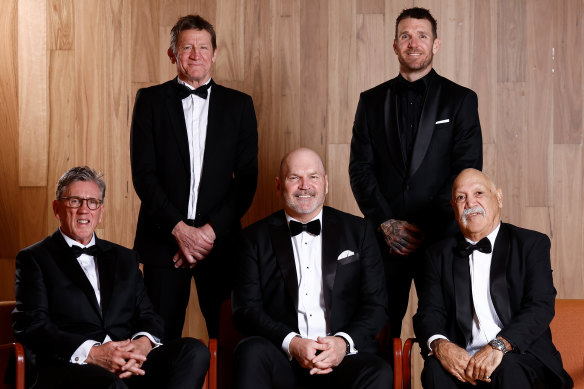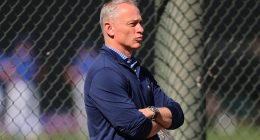Brownlow medallists Dane Swan and Kelvin Templeton have been honoured for their glittering contributions to the game with induction into the Australian Football Hall of Fame.
On a night when Hawthorn’s champion goal-kicker Jason Dunstall was officially elevated to Legend status, Swan and Templeton were named among six new inductees.
Inaugural Adelaide Crows captain Chris McDermott, Indigenous speedster Michael Graham, West Perth great Ray Schofield and New South Wales pioneer Ralph Robertson were also acknowledged.
Much-loved by a legion of fans in the Magpie Army, Swan was a leader of Collingwood’s famous “rat pack” during their successful period under coaching legend Mick Malthouse and his successor Nathan Buckley.
Swan was at times criticised for not looking like a professional athlete, and courted his share of off-field controversy, but was a genuine star of the competition on the field.
The prolific midfielder was a key contributor in the Magpies’ 2010 premiership under Malthouse and won the Brownlow Medal the following season, with what was then a record 34 votes under the 3-2-1 system.
He was also an All-Australian in five consecutive seasons from 2009-2013 and won the Copeland Trophy – Collingwood’s best-and-fairest award – for three straight years from 2008-10.
Swan’s brilliant 2010 campaign also included the AFL Players Association MVP award and the Jim Stynes Medal as Australia’s best player in the International Rules series against Ireland.
A close friend of Richmond superstar and future Hall of Fame member Dustin Martin, Swan retired in 2016 because of a serious foot injury after 258 games in black-and-white.
Templeton won his Brownlow in 1980 during a brilliant stint with Footscray that reaped 494 goals from 143 games.
He won the Coleman Medal in successive seasons (1978-79) as the VFL’s leading goal-kicker and is a two-time Bulldogs best-and-fairest winner (1978, 1980).
Templeton captained the Bulldogs in 1982 before adding 34 games and 99 goals in a three-year stint with Melbourne, retiring in 1985.
He later served as the Sydney Swans’ chief executive officer from 1995-2002, and helped the club develop into an AFL powerhouse on and off the field after its shaky start to life in the Harbour City following the relocation from South Melbourne.
McDermott was a two-time SANFL premiership player and captain of Glenelg before being called on to lead the Crows for four years, starting with their inaugural AFL season in 1991.
He is a four-time best-and-fairest winner – three Glenelg (1986-1988) and one Adelaide (1992) – and also went on to coach North Adelaide in the SANFL from 1997-2000.
Indigenous Team of the Century member Graham is regarded as one of the fastest and most skilful players of his generation, known as ‘The Flash’, and was central to Sturt’s success in the 1970s.
A two-time SANFL premiership player, the half-forward flanker was also part of three NTFL premiership teams with St Mary’s.
Robertson, who was killed on active service in 1917, played a total of about 150 games for East Sydney and North Shore in NSW, captaining both clubs and winning a premiership with each of them.
He captained NSW at the national carnival in three separate years and also played 14 games for St Kilda in the newly formed VFL in 1899-1900.
Schofield is a West Perth great, having played 277 games for the club and 21 times for Western Australia.
He played in two premierships with the Cardinals – as they were then known – in 1949 and 1951, and won five best-and-fairest awards in a career that spanned 16 years.
Schofield captained West Perth in 1952 and 1957-58, also coaching the club in his final season.
Dunstall’s elevation as the game’s 32nd Legend was confirmed in April.
A four-time premiership player with Hawthorn, Dunstall kicked 1254 goals in a glittering 269-game AFL/VFL career before injuries forced him into retirement in 1998.
Only Tony Lockett (1360) and Gordon Coventry (1299) are higher on the competition’s all-time list of leading goal-kickers.
Dunstall was inducted into the Hall of Fame in 2002, as soon as he became eligible.
AAP

AFL Hall of Fame inductees Chris McDermott (top left), Dane Swan (top right), Kelvin Templeton (front left), Legend Jason Dunstall (centre) and Michael Graham (front right).Credit: AFL Photos
Jason Dunstall is on stage after some rapturous applause from the crowd.
“Really weird, really weird,” is asked how it felt to be back after more than 20 years since he first made the Hall of Fame in 2002.
“This is the best night in footy, bar none.”
He is entertaining the crowd with stories from his early days as a young Hawthorn player. He reminds everyone that he was forced into the “extra” running group during pre-season due to his physical condition at the time.
The great J.Dunstall is about to take to stage as a new Legend of the game. Tonight it’s official.

Jason Dunstall.Credit: Allsport
There were several references to Swan’s close friends, and his prized “rat pack”.
He said the biggest thing he missed from footy was spending time with his teammates, even though they had an annual catch up each December – something they he relishes.
“If me having to win this thing [getting in the Hall of Fame] gets us all here [in the room] tonight, well, I’m obviously happy to do it,” Swan said.
“Finally, to my family .… for supporting me throughout the years .… they rode the bumps a little bit harder than what I did.”

Dane Swan addresses the room.Credit: AFL Photos
Greg Baum writes on Dane Swan:
Before Dustin Martin, there was Dane Swan.
As of Tuesday night, he’s in the Australian Football Hall of Fame, but he was already a legend in the unofficial Hall of Tattooed Fame, alongside Martin, former teammate Dayne Beams, and long preceded by Fitzroy grandee Kevin Murray and Footscray and Richmond hard man Robbie McGhie.
Acclaiming Swan on Tuesday night, you could say words painted a thousand pictures. But initially, those tattoos hid a formidable footballer. An indifferent attitude and scrapes with the law almost led to his sacking by Collingwood. In his first four seasons, he played merely 30 games.
When the penny dropped, a different sort of archetype emerged: outwardly casual, inwardly so driven that he would win a Brownlow Medal, a Leigh Matthews Trophy, five All-Australian guernseys in a row and play a central role in a cherished premiership.
With his gait, which might be described as a dynamic shuffle, that beard and those tattoos, the insouciant act was easy to pull.
But the times suited him; they were dominated by mass-possession midfielders frequently rotated via unlimited interchange. Swan averaged nearly 27 a game, second only to Greg Williams, and in some games it was nearly 50 as the crowd counted them out loud. At his best, he was as compelling a figure as any in the game.
Read More: World News | Entertainment News | Celeb News
SMH








